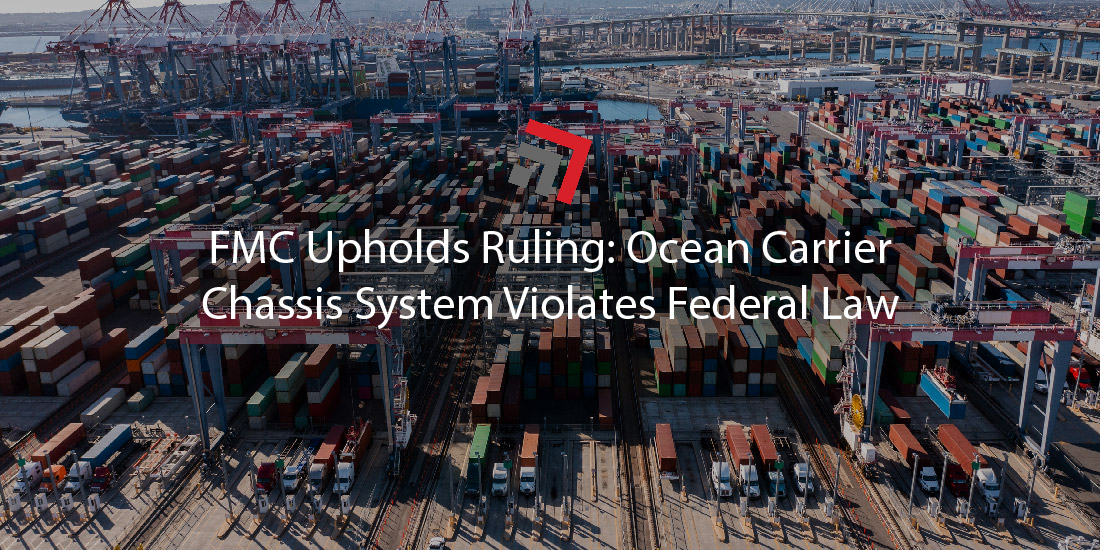Last week, one of the central authorities governing U.S. international trade flexed its legal muscle.
In a 4-1 vote on Feb. 13, the Federal Maritime Commission (FMC) upheld a previous ruling from a year ago that the current chassis system across intermodal markets violates federal law. This said system involves ocean carriers designating exclusive chassis providers for port-to-port moves. A practice that’s referred to as merchant hauling.
Motor carriers demand freedom of choice with equipment, FMC rules in their favor
The FMC’s involvement comes after a lengthy dispute between the Intermodal Motor Carriers Conference (IMCC), a branching organization of the American Trucking Associations that brought forward the case in 2020, and the Ocean Carrier Equipment Management Association (OCEMA), the defendant. OCEMA is a group solely focused on ocean carrier interests within the U.S. intermodal sector. Its body includes 12 ocean carrier members.
In the claim, the IMCC asserted the chassis system violated federal law, specifically parts of the U.S. code that address ocean freight shipping. The group cited that U.S. law says “a common carrier, marine terminal operator, or ocean transportation intermediary may not fail to establish, observe, and enforce just and reasonable regulations and practices relating to or connected with receiving, handling, storing, or delivering property.”
In other words, the IMCC argued that OCEMA’s practice of merchant hauling blocks motor carriers of their right to choose chassis providers and negotiate rates and terms of service. Under this practice, motor carriers are obliged to do business with predetermined equipment lessors designated by the ocean carrier party. The inability for motor carriers to make their own decisions have allegedly led to unjust and unreasonable prices.
The IMCC went on to add in the 2020 claim that chassis pools (systems) have historically been designed to allow motor carriers the freedom of choice, the right to choose a chassis from independent Intermodal Equipment Providers and, subsequently, be directly billed by the selected provider.
Fortunately for the IMCC, the FMC’s 73-page ruling made clear that the federal agency agreed with the presented arguments.
“[OCEMA’s] practice of designating a chassis provider for merchant haulage moves deprives motor carriers of service and denies them the opportunity to negotiate rates and terms of service,” the FMC wrote. “Interfering with motor carriers’ ability to choose among chassis providers affects basic interests that promote economic efficiency.”
Ocean carriers claim existing system prevents capacity crunch
The FMC also summarized counterarguments from OCEMA, the defendant, in the ruling. “Without the challenged restrictions, [OCEMA] contends there is no practical means of ensuring a sufficient supply of chassis at ports and inland facilities around the country,” the FMC writes. This refers to OCEMA’s claim that the merchant hauling system directs chassis providers to commit appropriate equipment availability at particular locations in exchange for the assurance that their capacity will not be underutilized. The group said this assurance comes from the providers’ contracts with ocean carriers.
OCEMA argued that, without that assurance, chassis providers could report a lack of utilization with their equipment in certain markets, thus threatening the supply of chassis needed to handle intermodal freight. The group argues that this would disrupt ocean carrier service through an equipment crunch.
However, the FMC further wrote: “[OCEMA’s] arguments that [IMCC] failed to prove financial harm or actual loss are legally immaterial.”
Final Thoughts
In a news release published on the American Trucking Associations’ website, the IMCC lauded the FMC’s decision to uphold the ruling that ocean carriers violated federal law.
“The FMC has now confirmed that the actions of these ocean carriers are a clear violation of federal law and must stop,” said IMCC Executive Director Jonathan Eisen. “IMCC and [American Trucking Associations] have been fighting this conduct by foreign-owned ocean carriers for more than a decade, so this ruling has been a long time coming.”
Eisen went on to add, “Hard-working American trucking companies will now be able to choose their chassis providers, rather than being taken advantage of by a cartel of overseas shipping lines.”
The IMCC is an affiliated branch of the American Trucking Associations, perhaps the most influential trucking interest group in the country.
Contact one of our team members if you have any questions regarding this topic or any others in domestic logistics.
More blogs similar to this:



Recent Comments